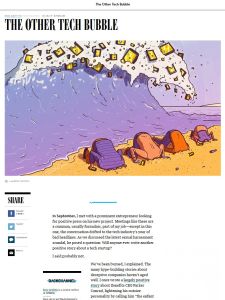
Erin Griffith
The Other Tech Bubble
Techies Still Think They’re the Good Guys. They’re Not.
Backchannel, 2017
What's inside?
Silicon Valley’s bad rap is here to stay.
Recommendation
For more than two decades, the American public was in love with Silicon Valley. In 2017, big tech is experiencing a public backlash. Sexual harassment scandals and the notion that technology companies are gaining too much power over people’s lives have battered the Valley’s reputation. Veteran Silicon Valley reporter Erin Griffith explains how this change in public perception is resonating among tech start-ups and why she is pessimistic about the Valley’s ability to resuscitate its image. getAbstract recommends her account to anybody puzzled by big tech’s rapid change in reputational fortune.
Take-Aways
- Silicon Valley tech start-ups used to enjoy a stellar reputation. The public perceived them as innovative underdogs driven by a desire to make the world a better place.
- Public opinion about Silicon Valley tech start-ups began to shift dramatically in 2017 following a series of scandals.
- Sexual harassment cases like Uber’s exposed Silicon Valley as a pervasively hostile work environment for women.
- Facebook’s widespread collection of personal data and its role in abetting government censorship highlight the immense influence big tech exerts over people’s lives.
- Silicon Valley has so far failed to address the issues that are tainting the Valley’s public perception.
Summary
Silicon Valley start-ups used to be everyone’s darling. Following the vilification of Wall Street in the aftermath of the 2008 financial crisis, the business media turned their attention to these young, dynamic tech firms that promised to change people’s lives for the better. Facebook was making the world more interconnected. Twitter facilitated communication among protesters during the Arab Spring. The media celebrated the quirkiness of start-up founders and the innovation-driven, nonhierarchical workplaces they created. That some start-up founders quickly became billionaires bothered few. These highly successful innovators were pursuing worthy causes, and they weren’t Wall Street bankers.
“Evidence is mounting that the world is no longer fascinated with Silicon Valley: It’s disturbed by its callous behavior.”
Public opinion about Silicon Valley tech start-ups began to shift dramatically in 2017. A series of scandals revealed Silicon Valley’s fault lines. Sexual harassment cases like Uber’s exposed Silicon Valley as a pervasively hostile work environment for women. Revelations about Facebook’s widespread collection of personal data and its role in helping governments censor political speech emphasized the immense influence these companies exert over people’s lives. A cheerful announcement by Bodega that its vending machines would soon replace neighborhood corner stores caused widespread backlash on Twitter and painted the company as arrogant and out of touch with people’s lives. The scandals have made venture capitalists more cautious about investing in Silicon Valley start-ups, knowing that their reputations might suffer. Furthermore, civil society organizations and governments are increasingly demanding stricter regulations for tech companies related to antitrust, compliance or transparency concerns.
“In 2008, it was Wall Street bankers. In 2017, tech workers are the world’s villain.”
Today’s big tech companies are no longer underdogs disrupting industries. They have become powerful economic forces in their own right. Yet few inside the industry are willing to address the issues that sparked the change in the public perception of the Valley. Technology companies continue to run their companies the same way as before the scandals broke. Industry leaders seem unresponsive to the negative headlines they receive – be that because they still believe in the righteousness of their companies’ mission or because they understand that their technology products have become an indispensable part of modern life. In turn, they will unlikely be able to resuscitate their image.
About the Author
Erin Griffith is a senior writer at Wired, which produces the Backchannel blog.
This document is restricted to personal use only.
My Highlights
Did you like this summary?
Read the articleThis summary has been shared with you by getAbstract.
We find, rate and summarize relevant knowledge to help people make better decisions in business and in their private lives.
Already a customer? Log in here.



















Comment on this summary